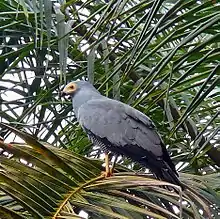| Polyboroides | |
|---|---|
 | |
| African harrier-hawk (Polyboroides typus) | |
| Scientific classification | |
| Domain: | Eukaryota |
| Kingdom: | Animalia |
| Phylum: | Chordata |
| Class: | Aves |
| Order: | Accipitriformes |
| Family: | Accipitridae |
| Subfamily: | Polyboroidinae |
| Genus: | Polyboroides A. Smith, 1829 |
| Type species | |
| Polyboroides typus[1] A. Smith, 1829 | |
| Species | |
|
See text | |
Polyboroides is a genus of bird of prey in the family Accipitridae. This genus has two recognized species found in Sub-Saharan Africa and Madagascar. The two species are allopatric and restricted to the Afrotropical realm. They are generally known as harrier-hawks.
Etymology
Polyboroides: Genus Polyborus Vieillot, 1816; Greek: -οιδης -oidēs "resembling".[2]
Species
The genus Polyboroides has two recognized species:[3][4]
| Image | Scientific name | Common Name | Distribution |
|---|---|---|---|
 | Polyboroides typus (Scopoli, 1786)[5] | African harrier-hawk | Sub-Saharan Africa |
 | Polyboroides radiatus Smith, 1829[6] | Madagascar harrier-hawk | Madagascar |

Adult African harrier-hawk hunting at a weaver colony in Etosha NP.
Note the double-jointed legs enabling it to hang downwards and yet reach upwards with its beak.
Note the double-jointed legs enabling it to hang downwards and yet reach upwards with its beak.
See also
References
Wikimedia Commons has media related to Polyboroides.
Wikispecies has information related to Polyboroides.
- ↑ "Accipitridae". aviansystematics.org. The Trust for Avian Systematics. Retrieved 2023-07-26.
- ↑ Jobling, J.A. (2017). "Key to Scientific Names in Ornithology". In del Hoyo, J.; Elliott, A.; Sargatal, J.; Christie, D.A.; de Juana, E. (eds.). Handbook of the Birds of the World Alive. Barcelona: Lynx Edicions.
- ↑ Clements, J. F. 2007. The Clements Checklist of Birds of the World, 6th Edition. Cornell University Press. Downloadable from Cornell Lab of Ornithology
- ↑ "Polyboroides". Integrated Taxonomic Information System. Retrieved 14 April 2011.
- ↑ BirdLife International (2016). "Polyboroides typus". IUCN Red List of Threatened Species. 2016: e.T22695409A93508060. doi:10.2305/IUCN.UK.2016-3.RLTS.T22695409A93508060.en. Retrieved 11 November 2021.
- ↑ BirdLife International (2016). "Polyboroides radiatus". IUCN Red List of Threatened Species. 2016: e.T22695415A93508513. doi:10.2305/IUCN.UK.2016-3.RLTS.T22695415A93508513.en. Retrieved 11 November 2021.
This article is issued from Wikipedia. The text is licensed under Creative Commons - Attribution - Sharealike. Additional terms may apply for the media files.